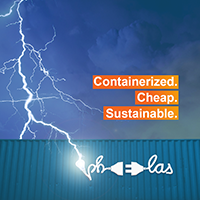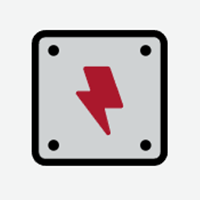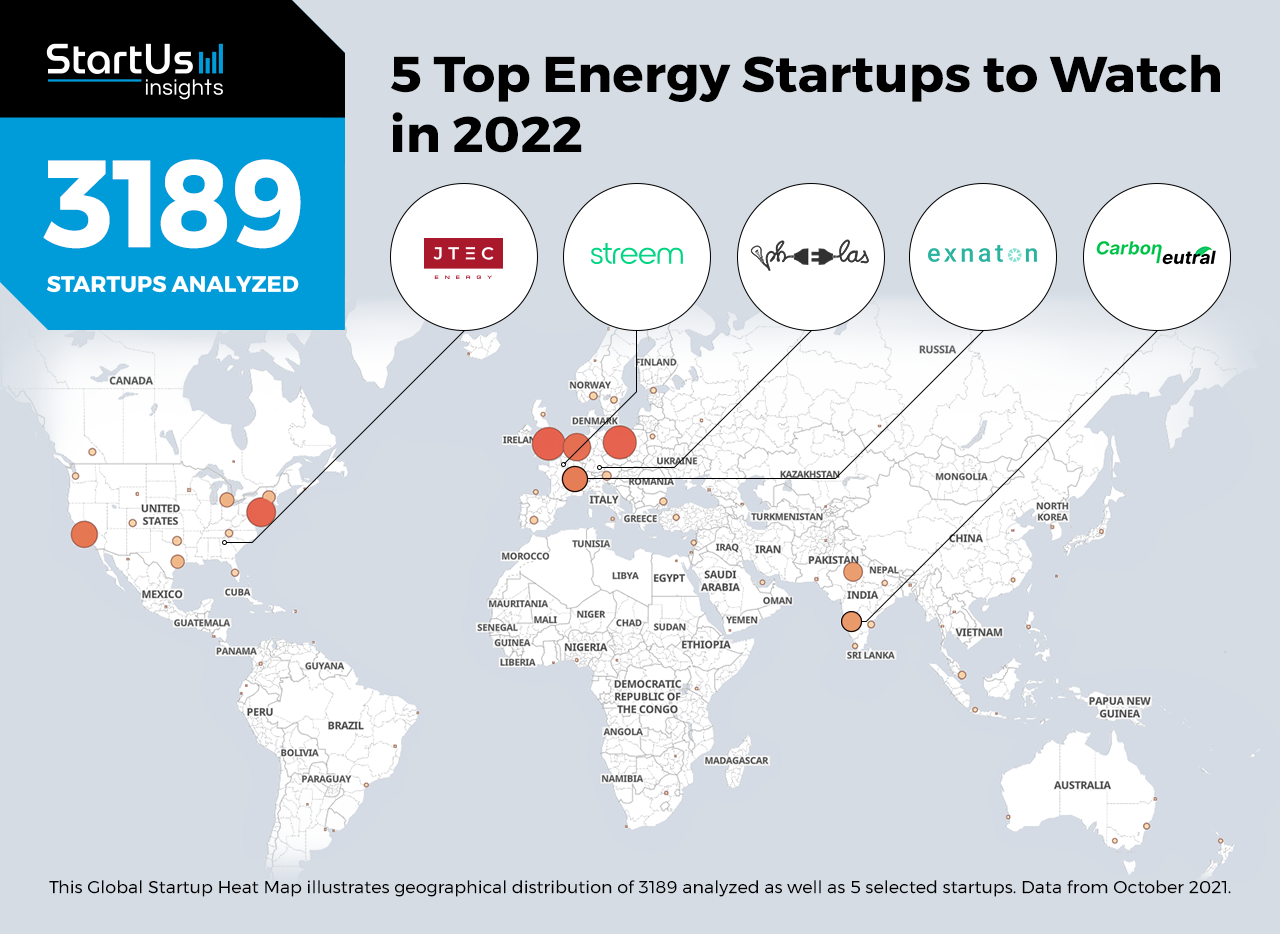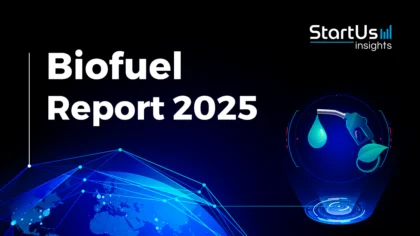Thousands of new startups are founded every year – emerging companies with the potential to disrupt the energy industry. To give you a head-start on emerging technologies and startups that will impact the energy sector in 2022, we analyzed a total of 3 189 global energy startups & scaleups. Meet 5 of the most promising startups to watch!
Global Startup Heat Map highlights 5 Energy Startups to Watch in 2022
Out of 3 189, the 5 energy startups to watch are chosen through the Big Data & Artificial Intelligence (AI)-powered StartUs Insights Discovery Platform, covering over 2 093 000+ startups & scaleups globally. As the world’s largest resource for data on emerging companies, the SaaS platform enables you to identify relevant startups, emerging technologies & future industry trends quickly & exhaustively.
The Global Startup Heat Map below highlights the 5 energy startups you should watch in 2022 as well as the geo-distribution of the other 3 184 startups & scaleups we analyzed for this research. We hand-picked the 5 highlighted energy startups based on our data-driven startup scouting approach, taking into account factors such as location, founding year, the relevance of technology, and funding, among others.
Carbon Neutral provides Renewable Energy Systems
 Founding Year: 2020
Founding Year: 2020
Location: Bangalore, India
Use for: Wind Energy Systems, Solar Energy Systems, Biogas Plants for Households
Carbon Neutral is an Indian startup that offers renewable energy generation systems. The startup’s range of products includes solar, wind, and biogas plants for commercial and domestic purposes. It, in effect, enables companies, power producers, and households to reduce dependence on fossil-fuel-based energy. Unlike renewables, fossil fuels are harmful to the environment and significantly accelerate global warming. At the same time, Carbon Neutral’s services enable all stakeholders in transitioning to a cleaner energy source and decouple daily energy needs from the grid. This is greatly important at this moment as the grid load is increasing due to automotive electrification. Altogether, the startup is a one-stop solution to the needs and choice of the customers to enjoy carbon-free energy storage.
phelas develops a Utility-Scale Energy Storage Solution
 Founding Year: 2020
Founding Year: 2020
Location: Munich, Germany
Funding: USD 700 000
Use for: Utility-Scale Energy Storage, Grid Stabilization
German startup phelas provides Aurora, a utility-scale energy storage solution for energy producers, operators, and manufacturing companies. Aurora uses a thermodynamic storage system built on the liquid air energy storage (LAES) principles. Its proprietary processes also include a heat management system and a custom cooling system along with a simplified liquefaction method. Batteries used in conventional storage systems are heavy, inefficient, and unscalable, rendering them unfavorable for utility-scale storage. On the other hand, phelas’ solution is a modular container system flexible in scaling power and capacity independently. Aurora does not use harmful materials and, hence, reduces environmental risks due to energy storage systems. In effect, energy utilities and operators are able to increase the reliability of intermittent energy resources and stabilize the grid.
Exnaton advances Energy Sharing
 Founding Year: 2020
Founding Year: 2020
Location: Zürich, Switzerland
Funding: USD 100 000
Use for: Peer-to-Peer (P2P) Energy Trading
Swiss startup Exnaton facilitates energy sharing through its peer-to-peer energy trading platform. The startup combines smart meter data and advanced analytics to run a local energy market that allows households to trade energy directly. This is especially useful for remote communities where grid infrastructure does not exist or lacks effective maintenance. Besides, it enables consumers and producers to disconnect from the grid and rely on local, clean energy. At the same time, Exnaton encourages consumers to become prosumers by providing a new source of income. All this improves renewable deployment, load management, and energy access.
Streem Energy enables Centralized Asset Management
 Founding Year: 2020
Founding Year: 2020
Location: Paris, France
Use for: Portfolio Management, End-to-End Value Chain Management
Streem Energy is a French startup that offers centralized asset management for distributed energy production units. The startup connects the entire energy value chain through its platform to optimize production, trade, distribution, and consumption. Unlike fossil fuels, the intermittent nature of primary renewable sources, such as solar and wind plants, demands energy companies to plan operations accurately. With Streem Energy’s web application, they are able to monitor their asset portfolios and ensure profits constantly. In addition, the startup centralizes all asset data as well as allows users to integrate their tools into existing workflows using application programming interfaces (APIs). Consequently, energy professionals are able to utilize multi-sources flow management for billing and balancing while its high-performance forecasting models provide generation and consumption insights.
JTEC Energy develops a Heat-to-Electricity System
 Founding Year: 2020
Founding Year: 2020
Location: Atlanta, Georgia, US
Funding: USD 2,2 M
Use for: Waste Heat Recovery, Heat-to-Electricity Conversion
JTEC Energy is a US-based startup that produces a heat-to-electricity generation system. The startup’s electrochemical converter combines a membrane electrode assembly (MEA), highly reversible chemical reactions, and a temperature differential to pressurize hydrogen. It produces energy higher than the amount required to run the system. While heat-to-electricity systems, like solar panels, are already available the startup’s solution improves the scalability and efficiency of heat capture. Hence, it is usable in small devices such as wearables as well as be coupled with factories to directly convert heat into electricity. The lack of moving parts also makes it easy to manufacture and less expensive than conventional Stirling engines. JTEC Energy’s solution serves a wide range of industries and enables them to upcycle waste heat while reducing energy costs.
Discover All Emerging Energy Startups
The energy startups showcased in this report are only a small sample of all startups we identified through our data-driven startup scouting approach. Download our free Energy Innovation Report for a broad overview of the industry or get in touch for quick & exhaustive research on the latest technologies and emerging solutions that will impact your company in 2022!









